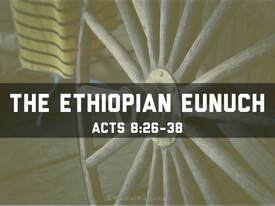
 ‘Do you understand what you are reading?’ Philip’s question in Acts of the Apostles chapter 8 is such a great one, and it echoes down the centuries. Do we understand what we are reading when we read scripture? Whether we are conservative or varying degrees of liberal, it is easy to think we do. But do we really? This question is one reason that we have a sermon, or homily, or, as this community likes to call it, a reflection, in worship. For, as the eunuch responds, how can we understand unless we have a guide? The alternative is just using scripture as a looking glass, reflecting only our own faces, hopes, fears, and presuppositions. Note well, a guide to scripture is not a simple giver of answers, and certainly not determinative for all times and places. For we continue to reflect on scripture, again and again, precisely because God’s living Word, capital ‘W’, is revealed in scripture but is not fixed within its small ‘w’ words. Rather, as the great biblical interpreters have always said, God’s living Word emerges out of scripture in the encounter of human beings with the text, as guided by one another, our contexts and our deep Tradition, through the power of the Holy Spirit, the ultimate guide and inspirator. This is crucial to recall, lest we are tempted to believe that scripture is too easily understood: whether over-exalted into an idol or a supposed instruction manual, as conservatives are sometimes drawn to do; or reduced to a mere item of intellectual curiosity or piece of cultural heritage, as progressives are inclined to do. Either way, that loses the real subversive power of faith which scripture can hold for us, particularly in stories such as of the Ethiopian eunuch: which, in my view, is one of the most subversive of all in scripture, not least in its queering dimensions…
0 Comments
 image: Kamala Bright on Unsplash image: Kamala Bright on Unsplash ‘Tell me the old, old story, when you have cause to fear.’ Yes? No? Maybe? How do you respond to that: and, more broadly, to faith, and God, in Jesus, as story? Many years ago, on the radio, one of the radical thinking clergy of the Church of England was asked about how they understood God. ‘God’, they said, ‘is the poem in which I live my life.’ Yes? No? Maybe? Does that resonate with you? Many people, secular and faith-based, would be quite dismissive. Stories, and poems not least, they would say, are typically fanciful and not factual, fabricated and too often false. Of course, that kind of response generally lacks self-awareness and is very narrow, and, often, quite ideological. Apart from not recognising that different expressions of life have their own characteristics and validity, they typically miss the way in which story, metaphor, and symbol, exist within all areas of knowledge. Science for example is full of different models, and ideas like evolution are themselves stories. Scientists are right in saying that life-giving stories are helped by empirical verification. Yet, without stories as such, it is impossible for human life and consciousness to exist. That is something that liberals and progressives, especially in faith spaces, have often missed. It is not enough to point out the weaknesses in a tired traditionalist story: whether that be about creation, sexuality, or anything else. Even more importantly, we also need to tell a new story. Populist politicians, like rabble-rousing religious preachers, know this well. Facts are malleable but stories, once established, persist: whether they are particular ways of understanding the body, the nation, the world, and, of course, God. All of us therefore have stories, conscious and unconscious, running through our heads: some of them planted there long ago, some of them picked up from the latest social media frenzy; some of them giving life-giving purpose to our lives, others providing scripts that limit us but which are hard to shake off. What then is our story?... 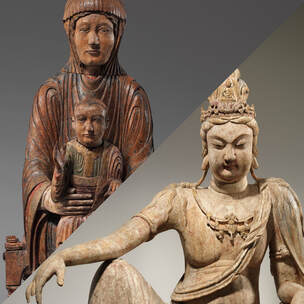 Enthroned Virgin and Child (1150-1200 France) & Bodhisattva Avalokiteshvara in Water Moon Form/Shuivue Guanyin (907-1125 Liao dynasty) from the Metropolitan Museum of Art, New York Enthroned Virgin and Child (1150-1200 France) & Bodhisattva Avalokiteshvara in Water Moon Form/Shuivue Guanyin (907-1125 Liao dynasty) from the Metropolitan Museum of Art, New York Wake up! Keep awake! These are familiar injunctions in Advent. What however do they mean to us today? What are we to wake up to? And for what is it that we are to keep awake? At the heart of the Advent and Christmas mysteries, is a call to transformation: an invitation to awaken, to recognise what is really going on in ourselves and in the wider world; an invitation to respond, to wake up, to the divine possibilities latent, or birthing, within us. Whether it be through stories and images of wonder and imagination, as in the Christmas angels and the Magi, or in today’s Gospel challenge to see beneath the changes and chances of our immediate existence, we are invited into transformation: the ever-transforming power of divine love and awakening… 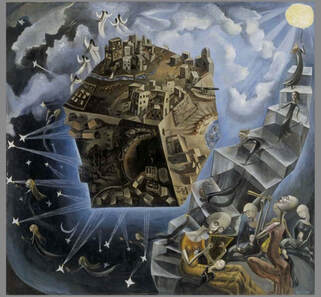 Un Mundo, by Ángeles Santo, Museo Reina Sofia Un Mundo, by Ángeles Santo, Museo Reina Sofia What value does the book of Revelation have for us, especially in the face of ecological crises? My guess is that most of us have not spent too much time on the Bible’s last book. Some people of course have, including those looking for a special secret code to life and history, and those puzzling out different timetables for Christ’s second coming. Such interpreters however typically have little concern for ecology, and some even welcome signs of environmental apocalypse. Faced by the strangeness of John the Divine’s visions, we may therefore be tempted to dispense with the book altogether. Yet that would be a mistake. For, as this morning’s reading (ch.12 vv. 1-9 & 13-17a) illustrates, truth and light can be received in the strangest places…  image: The Meeting of Rebekah and Isaac, Nasher Museum of Art, Duke University image: The Meeting of Rebekah and Isaac, Nasher Museum of Art, Duke University The Bible is known to many as ‘The Good Book’, but is it actually a good book, morally speaking? In the USA this has become a political, as well as a theological, question. A Utah school district recently banned the Bible from its elementary and middle schools for what it named as ‘vulgarity and violence’.[1] This followed a parent’s complaint that the Bible has material unsuitable for children, after Utah’s Republican government had passed a law in 2022 banning ‘pornographic or indecent’ books from schools. This is not an isolated case. For recent conservative bans on books have been particularly aimed at education around LGBTIQA+ issues. Yet this can easily rebound, as it draws attention to the Bible’s moral ambiguities. Religious conservatives often assume the Scriptures to be unadulterated good news for all. Meanwhile some secularists tend to assume bad news. However, read as a whole, the Bible’s reality is that it rarely offers simple black and white morality. Rather it invites us to wrestle with its challenges, and inspirations. From this we can indeed grow in the faith, and power, of God to which the Scriptures witness. We do so however by deepening our sense of God working with and through our very human realities, not escaping from them. This is certainly true of Rebekah and Isaac, who are centre-stage in our Genesis story (in chapter 24) today… Today’s Gospel reading is a very rich passage, full of extraordinary metaphors, story and meaning. It includes, for example, that powerful central affirmation of Christian Faith that God so loved the world that they sent their Beloved One that all who believe may have eternal life. Note well the heart of this good news: that God loves the world so much that all who believe – not just the doctrinally righteous, or the ethically conservative, but all may have eternal life. For the God we celebrate today is the God of unlimited, inexhaustible, love. As our Gospel text says, Christ comes among us not for condemnation, but for love and salvation. Let us therefore affirm again that you, we, all of us, are loved. The Gospel, our Good News, invites us to claim this, and live it. All of which brings us, in this passage, to the person of Nicodemus, and to light, and darkness… 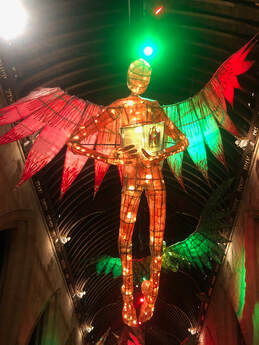 So, angels are coming. How will we greet them? At once, perhaps we start to ponder: but what are we greeting? And are there such things as angels anyway? Modernity’s functional materialism has so much to answer for! From a Reformed Christian perspective today it is also sometimes hard to engage. For whilst the classic Reformed theologians were quite clear that angels are to be taken very seriously, as they appear in so many places in the Bible. Yet later thinkers have found less value. In some quarters of liberal and progressive Protestantism they almost became erased: rejected with supposedly passé doctrines like the virgin birth, miracles and even major articles of the historic creeds. Ironically, as liberal Protestantism declined, other faith constructions began to thrive, not least New Age spiritualities with their extraordinary mix of angelic and other speculations. Did demythologising thereby open the door to old heresies? - as well as to a loss of divine wonder in the secular world? Certainly, as Les Murray pondered in his poem ‘The Barranong Angel Case’, which we heard read earlier, do we have the capacity to see and receive the angels of Christian tradition today? In recent years some of my Aboriginal friends have said to me that they do not really believe in the Australian concept of Reconciliation and some of the activities, like Reconciliation Action Plans, which have accompanied it. Meanwhile some Church leaders have said to me that they do not see much point in engaging actively in ecumenical endeavours. So why, we might ask, are we marking the Week of Prayer for Reconciliation and the Week of Prayer for Christian Unity this morning? Actually I did wonder about changing the title on the front of our liturgy sheet today to ‘Prayer for Just Relationships and Communion in Christian Diversity’. That, for me, would be at least part acknowledgment of the difficulties of the words Reconciliation and Christian Unity and the need for re-imagining as well as building on the good work of the past. However I have left Reconciliation and Christian Unity in the title for the present, so we honour where we have traveled. Nonetheless, as we hear our two readings this morning (from Revelation chapter 22 and John chapter 17), we do well to reflect more deeply on the words and constructions we may use in order that we share in more fruitful pathways for our work together with others. For that purpose I also offer you the cartoon meme entitled the #4thBox, as an encouragement to deeper prayer, more imaginative reflection and more creative action…
Good morning! It is a delight to be back here in Pitt Street after several weeks away on personal ‘sorry business’ and study leave. In the context of the continuing pandemic, it has certainly been what some might call an ‘interesting’ time, marking an important watershed in my own life and that of my wider birth family. In offering some reflections today, I would therefore like to begin by expressing my deep gratitude for the many, many. wonderful expressions of support from members of our Pitt Street community, and for the prayers which have been offered. I continue to be so grateful for the gift of loving relationships I am given as part of our life together, and I look forward to their further and deeper unfolding in the days to come. For relationship is such a core element of our lives, and never more important than at times of loss, grief, challenge and growth. As such, it is so absolutely foundational to the Day of Mourning we mark today, as well as to the trials of the pandemic world with which we continue to journey, and the struggles of our own particular lives. In the light of these things, my own recent and continuing journey, and of our readings today, I offer up relationship as one of three words which might be central to our considerations at this time.
 Growing up, even as a little child I was fascinated by what was then known as the English Civil War (although, to be accurate historically, this is now rightly recognised as several different wars across the islands of Britain and Ireland). It was a bitter and brutal period, culminating in the judicial trial and execution of the King. For this was a powerful revolution. Indeed it saw the establishment of a republic, the Commonwealth and Protectorate under Oliver Cromwell. Moreover, in that latter period there was also an extraordinary flowering of truly radical religious and political life and thought. That, I think, was what especially drew me into the study of history. For the origin of many liberal democratic things we take for granted lie there – for example, the insistence on no taxation or legislation without representation, on regular elections, fixed parliamentary terms, equal votes, and, vitally, on religious freedom for different types of groups, particularly the marginalised. Indeed, Cromwell even reopened England to the Jews, who had been banned for centuries. For his supporters were also part of the movements which helped create Congregationalism, the original founding tradition of Pitt Street Uniting Church... |
Authors
sermons and reflections from Penny Jones & Josephine Inkpin, a same gender married Anglican clergy couple serving with the Uniting Church in Sydney Archives
June 2024
Categories
All
|
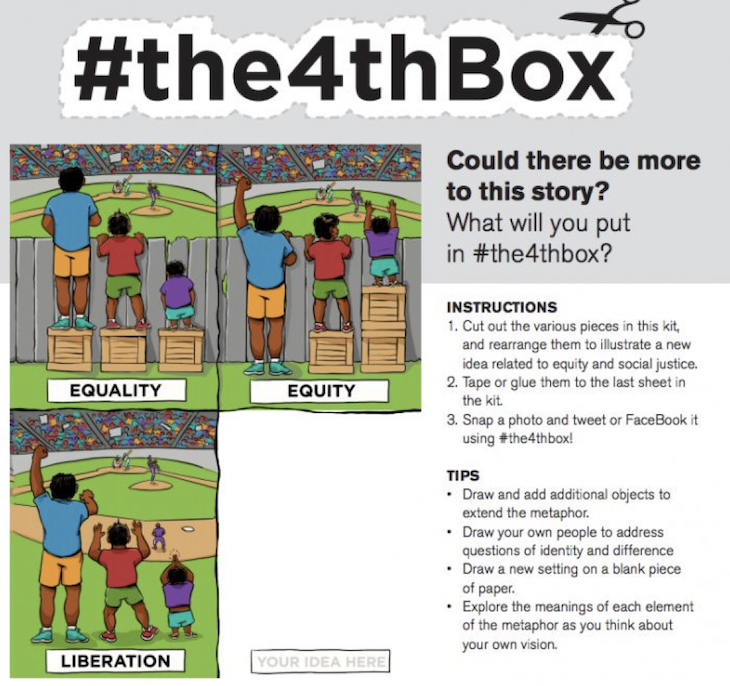
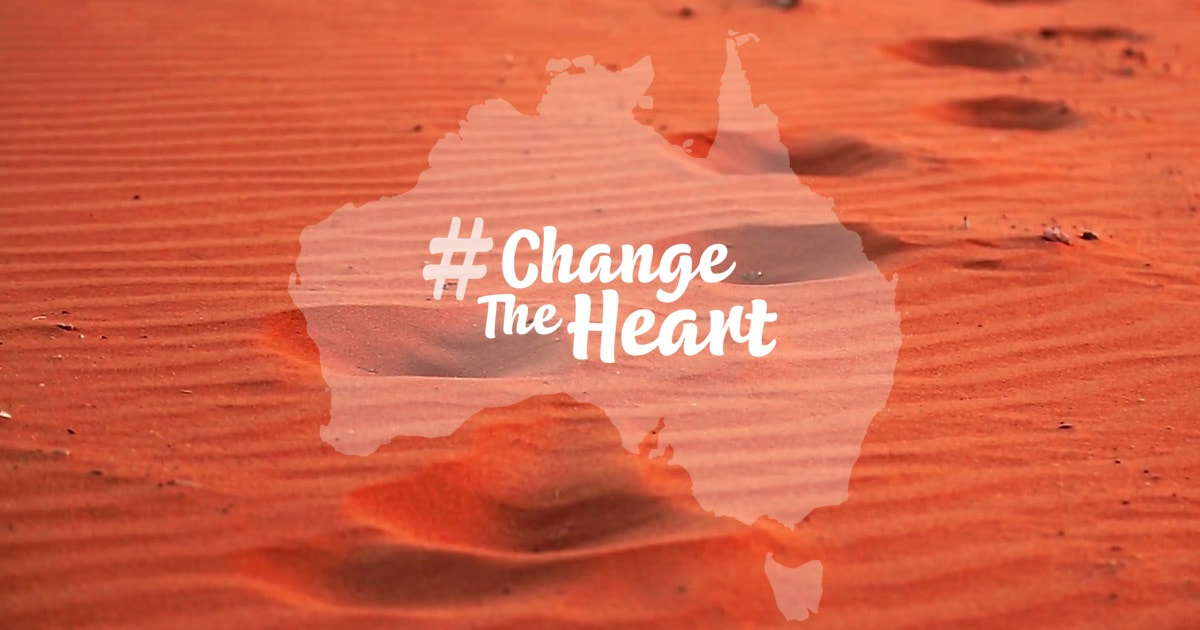
 RSS Feed
RSS Feed